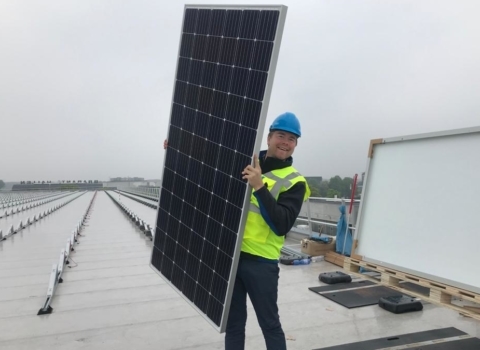As operation manager, Ruben is responsible for the realization of solar projects, from start to finish. And there is more to that then you think! An extensive process needs to be finished before delivering sustainable solar electricity to our customers. Development, engineering, funding, project management, procurement and then construction and monitoring. Ruben: “People think it’s a matter of buying panels and installing them. But the entire process is much more complex than only these. There are so many other things involved. 80% of the project is finished before we even start constructing.”
Complexity makes it interesting
On average, Ruben spends three days in the office and two on customers production’ sites, every week. His office days include meetings with the project team and a lot of logistic tasks.
SolarAccess is specialized in roof-bound solar systems. On flat roofs, the solar panels are installed at a 10-15 degree angle. On sloping roofs (over 5 degrees) the panels are mounted flatly. Every year SolarAcces finishes around more than 40 major projects, equal to a 1000 panels a week.
Ruben: “For me, the complexity of our projects makes this job exciting and fun. We are selling sustainable power and that involves contracts, investments and technical risks. The international aspect of this job is very interesting as well. Different cultures and legislation. Discovering the way things work in other countries has a high interest for me ”
Kilowatt hours instead of panels
Customers often compare SolarAccess to companies that sell solar panels, but that’s not the correct comparison. The main difference is that Solar Access is selling solar power, we don’t sell panels. Ruben: “We are an energy supplier, the solar panels remain our property. There are hundreds of companies that offer and install solar panels in The Netherlands. But there are less than ten companies that do exactly what we do. In a contract between Solar Access and our customers, the purchase of power is agreed on for an x-amount of years. And, Solar Access is authorized to install the panels on the concerning rooftops. At Solar Access you buy kilowatt hours, not solar panels.”
“At Solar Access our customers buy kilowatt hours, not solar panels.”
Our main target consist in large companies
SolarAccess approach is particularly targeting large companies which are not interested in purchasing solar panels but green sustainable electricity. Solar panels have quite a long payback period and that often doesn’t match with corporate strategies. “Some of our customers are large multinationals, like for example Pepsico, Heineken, Wavin etc. Our way of working is very suitable for these kind of companies.”
Do you want to purchase solar panels, or do you want to work with a company that takes over the funding, so that you don’t have to invest? That’s what companies should think about. Even without investing you are able to use your own solar power.
Technological developments
Solar Acces wants to realize as high a power output as possible, while keeping expenses as low as possible. We want to provide customers with green power, at a competitive rate. That’s why it is important for us to keep up with technological developments. Keeping in touch with our suppliers is important. Ruben: “We regularly meet our suppliers and visit technology events and exhibitions, where recent developments and new products are presented.” In the past we often used poly-panels, so called ‘blue cell’ panels. Recently, mono-panels are the most efficient. These panels have a higher output per square meter. Ruben: “The growing size of solar panels is another recent technological development. Two years ago we needed mounting materials and labour for 4000 panels. For the same area we now need 3500 panels. These are offering a more efficient coverage with great results on generated green electricity .”
Future outside of Europe
The last couple of years Solar Access has mainly focussed on the European market. For the next few years our target market will be worldwide. In Northern) Europe, the installation of solar panels is financially appealing when National of European subsidies are granted. In many other countries though, both solar radiation and energy prices are higher. Allowing companies to build without subsidies. Ruben: “We want to create steady markets and not depend on subsidies. In some southern European countries like Italy, Portugal, Spain and Greece that is already possible.
Additionally, we definitely foresee a long-term future for solar energy in less developed countries, where the amount of power used is relatively low at the moment. It would be awesome if a sufficient amount of sustainable electricity can be generated there, to meet the increasing demand in those countries. In this way we can fulfil our purpose of making a significant sustainable impact by unlocking the positive energy of the sun, every day, roof by roof, project by project.”







